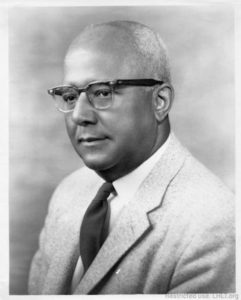
William Hansberry
*William Hansberry was born on this date in 1894. He was a Black educator and scholar.
From Gloster, Mississippi, William Leo Hansberry was the son of Elden Hayes and Pauline (Bailey) Hansberry. His father, who taught history at Alcorn College, set the direction of Hansberry’s life. The elder Hansberry died when his son was three years old, but he left him the priceless legacy of a library on the culture and customs of the ancient world. Young Hansberry enjoyed reading his late father's collection of books. He could not help wondering, however, why they held so much information about the glorious histories of Greece, Rome, and even China but so little about Africa, the home of his own ancestors. He attended Clark/Atlanta University in 1916, where he came under the Influence of W. E. B. Du Bois. In 1917, Hansberry transferred to Harvard University, receiving his B.A. degree in 1921 and M.A. degree in 1932.
After teaching for a year at Straight College in New Orleans in 1922, Hansberry joined Howard University and taught courses on African civilizations and cultures until his retirement in June 1959. During this time, he researched at the University of Chicago in 1936, Oxford University in 1937 and 1938, and the University of Cairo in 1953 and 1954. Also, in 1937, he married Myrtle Kelso; they had two children: Gail Adelle and Myrtle Kay. While at Howard (in 1925), he organized and coordinated a major symposium and exhibition held on campus where his students, sixteen of which were women, presented twenty-eight scholarly papers. In 1927, Professor Hansberry spoke at the Fourth Pan-African Conference in New York on African archaeological research and its significance for African people.
In 1934, he helped organize the Ethiopian Research Council. This council aimed to "Stimulate interest in Ethiopia's efforts to resist the Italian invasion and to disseminate information on Ethiopian history, ancient and modern.” Correspondents were in London, Paris, Rome, and Addis Ababa; affiliates were listed in Ethiopia, France, Panama, Chicago, New York, and Philadelphia. During the mid-1950s, Hansberry engaged in field research in Ethiopia, Egypt, Sudan, Kenya, Uganda, Zimbabwe, Zaire, Ghana, and Nigeria.
He also visited Tanzania, Malawi, Zambia, and Liberia. In 1955, for the Journal of Negro Education, he reviewed George G.M. James' classic--Stolen Legacy. In 1955 and 1956, for the Washington Post and Africa Today, he reviewed Ghanaian scholar J.C. deGraft-Johnson's African Glory: The Story of Vanished Negro Civilizations. Hansberry's magnum opus, The Rise and Decline of the Ethiopian Empire, was never published, although Kwame Nkrumah and Noamdi Azikiwe invited him to publish the work in Africa.
Hansberry was slighted and snubbed for much of his life, not only by white academia but by Black academics. One of his greatest consolations was his students' love, admiration, and respect. Besides Dr. Chancellor Williams, one of Hansberry's most prominent pupils, there was Noamdi Azikiwe, who became the first President of the Federal Republic of Nigeria. Lorraine Hansberry, the African American playwright, was Hansberry's niece. In September 1963, Hansberry delivered the inaugural address at the formal opening of the Hansberry College of African Studies at Nsukka, University of Nigeria. In 1964, he became the first recipient of the African Research Award from the Haile Selassie I Prize Trust.
He was possibly a man born one generation too soon. A pioneer in the study of ancient African history, it was a time when the Black academic community was far more concerned with creating a livable present than resurrecting an ancestral past. He was one of the twentieth century's most distinguished and determined Africanist scholars. On November 3, 1965, at 71, William Hansberry died of a cerebral hemorrhage.
American Negro Reference Book
John P. Davis,
Prentice-Hall, 1966, p. 677.
The Mississippi Writers Page
Department of English
The University of Mississippi,
University, MS 38677
